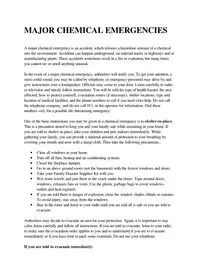
Chemical Emergencies - Major PDF
Preview Chemical Emergencies - Major
MAJOR CHEMICAL EMERGENCIES A major chemical emergency is an accident, which releases a hazardous amount of a chemical into the environment. Accidents can happen underground, on railroad tracks or highways and at manufacturing plants. These accidents sometimes result in a fire or explosion, but many times you cannot see or smell anything unusual. In the event of a major chemical emergency, authorities will notify you. To get your attention, a siren could sound, you may be called by telephone, or emergency personnel may drive by and give instructions over a loudspeaker. Officials may come to your door. Listen carefully to radio or television and strictly follow instructions. You will be told the type of health hazard, the area affected, how to protect yourself, evacuation routes (if necessary), shelter locations, type and location of medical facilities, and the phone numbers to call if you need extra help. Do not call the telephone company, and do not call 911, or the operator for information. Dial these numbers only for a possible life-threatening emergency. One of the basic instructions you may be given in a chemical emergency is to shelter-in-place. This is a precaution aimed to keep you and your family safe while remaining in your home. If you are told to shelter-in-place, take your children and pets indoors immediately. While gathering your family, you can provide a minimal amount of protection to your breathing by covering your mouth and nose with a damp cloth. Then take the following precautions... • Close all windows in your home. • Turn off all fans, heating and air conditioning systems. • Closet the fireplace damper. • Go to an above ground room (not the basement) with the fewest windows and doors. • Take your Family Disaster Supplies Kit with you • Wet some towels and jam them in the crack under the doors. Tape around doors, windows, exhausts fans or vents. Use the plastic garbage bags to cover windows, outlets and heat registers. • If you are told there is danger of explosion, close the window shades, blinds or curtains. To avoid injury, stay away from the windows. • Stay in the room and listen to your radio until you are told all is safe or you are told to evacuate. Authorities may decide to evacuate an area for your protection. Again, it is important to stay calm, listen carefully and follow all instructions. If you are told to evacuate, listen to your radio to make sure the evacuation order applies to you and to understand if you are to evacuate immediately or if you have time to pack some essentials. Do not use your telephone. If you are told to evacuate immediately: • Take your Family Disaster Supplies Kit and medications. • Close and lock your windows. • Shut off all vents. • Lock the door. • Move quickly and calmly. If the authorities tell you to evacuate because of a possible chemical emergency, take your Family Disaster Supplies Kit and pack: • A change of clothing for each member of the family • Medication, eyeglasses, hearing aids or dentures, or things like canes and walkers • Personal items such as toothbrushes, deodorant, etc. • Items for your baby such as diapers, formula or baby food • Books, puzzles or cards and games for entertainment Do not assume that a shelter will have everything you need. In most cases the shelters will provide only emergency items such as meals, cots and blankets. You don’t need to turn off your refrigerator or freezer, but you should turn off all other appliances and lights before locking your home as you leave. Check on neighbors to make sure they have been notified, and offer help to those with disabilities or other special needs. If you need a ride, ask a neighbor. If no neighbor is available to help you, listen to the emergency broadcast station for further instructions. Take only one car to the evacuation site. Close your car windows and air vents and turn off the heater or air conditioner. Don’t take shortcuts because a shortcut may put you in the path of danger. For your safety, follow the exact route you are told to take.
